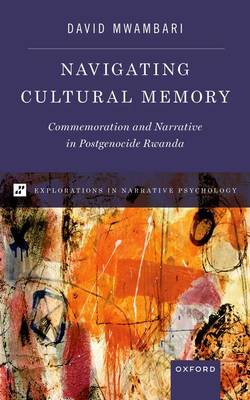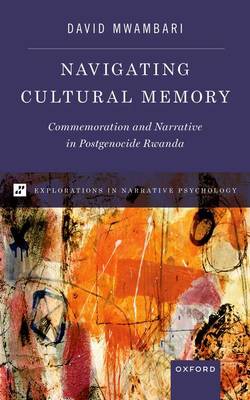
Je cadeautjes zeker op tijd in huis hebben voor de feestdagen? Kom langs in onze winkels en vind het perfecte geschenk!
- Afhalen na 1 uur in een winkel met voorraad
- Gratis thuislevering in België vanaf € 30
- Ruim aanbod met 7 miljoen producten
Je cadeautjes zeker op tijd in huis hebben voor de feestdagen? Kom langs in onze winkels en vind het perfecte geschenk!
- Afhalen na 1 uur in een winkel met voorraad
- Gratis thuislevering in België vanaf € 30
- Ruim aanbod met 7 miljoen producten
Zoeken
€ 87,45
+ 174 punten
Omschrijving
Navigating Cultural Memory examines how a master narrative of the 1994 Genocide Against the Tutsi evolved into a hegemonic narrative both in Rwanda and globally. Identifying key actors who shaped and responded to the evolution and enforcement of the master narrative in the first two decades after the genocide and civil war ended, it engages with important questions about collective memory, trauma, and power following violent and divisive events.
With chapters analyzing interviews the author collected, as well as other secondary sources, Mwambari charts how Rwandans from different backgrounds--who he identifies as Champions, Antagonists, and Fatalists of the master narrative--have responded to this event through language, physical symbols of memory, art, and traditional and new media. Mwambari argues that a relational approach to dignity can help transform polarizing narratives away from sources of competition, exclusion, and silence, and towards healing. Conversations about the politics around the master narrative and about the collective presentation of violent histories are not only important for contemporary politics but the key to Rwanda's present and future peace. By exploring these contradictions in memories between actors in Rwanda and abroad, Navigating Cultural Memory offers crucial insights into the complexities surrounding individual and collective memory in societies recovering from violent conflict, mass atrocities, and genocide.
With chapters analyzing interviews the author collected, as well as other secondary sources, Mwambari charts how Rwandans from different backgrounds--who he identifies as Champions, Antagonists, and Fatalists of the master narrative--have responded to this event through language, physical symbols of memory, art, and traditional and new media. Mwambari argues that a relational approach to dignity can help transform polarizing narratives away from sources of competition, exclusion, and silence, and towards healing. Conversations about the politics around the master narrative and about the collective presentation of violent histories are not only important for contemporary politics but the key to Rwanda's present and future peace. By exploring these contradictions in memories between actors in Rwanda and abroad, Navigating Cultural Memory offers crucial insights into the complexities surrounding individual and collective memory in societies recovering from violent conflict, mass atrocities, and genocide.
Specificaties
Betrokkenen
- Auteur(s):
- Uitgeverij:
Inhoud
- Aantal bladzijden:
- 336
- Taal:
- Engels
- Reeks:
Eigenschappen
- Productcode (EAN):
- 9780190942304
- Verschijningsdatum:
- 4/07/2023
- Uitvoering:
- Hardcover
- Formaat:
- Genaaid
- Afmetingen:
- 163 mm x 237 mm
- Gewicht:
- 589 g

Alleen bij Standaard Boekhandel
+ 174 punten op je klantenkaart van Standaard Boekhandel
Beoordelingen
We publiceren alleen reviews die voldoen aan de voorwaarden voor reviews. Bekijk onze voorwaarden voor reviews.









